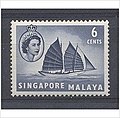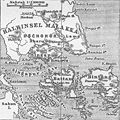Portal:Singapore
 Map of Singapore Singapore, officially the Republic of Singapore, is an island country and city-state in maritime Southeast Asia. It is about one degree of latitude (137 kilometres or 85 miles) north of the equator, off the southern tip of the Malay Peninsula, bordering the Strait of Malacca to the west, the Singapore Strait to the south along with the Riau Islands in Indonesia, the South China Sea to the east, and the Straits of Johor along with the State of Johor in Malaysia to the north.
The country's territory comprises one main island, 63 satellite islands and islets, and one outlying islet; the combined area of these has increased by approximately 25% since the country's independence as a result of extensive land reclamation projects. It has the third highest population density of any country in the world, although there are numerous green and recreational spaces as a result of urban planning. With a multicultural population and in recognition of the cultural identities of the major ethnic groups within the nation, Singapore has four official languages: English, Malay, Mandarin, and Tamil. English is the common language, with exclusive use in numerous public services. Multi-racialism is enshrined in the constitution and continues to shape national policies in education, housing, and politics. Singapore's history dates back at least eight hundred years, having been a maritime emporium known as Temasek and subsequently a major constituent part of several successive thalassocratic empires. Its contemporary era began in 1819, when Stamford Raffles established Singapore as an entrepôt trading post of the British Empire. In 1867, Singapore came under the direct control of Britain as part of the Straits Settlements. During World War II, Singapore was occupied by Japan in 1942 and returned to British control as a separate Crown colony following Japan's surrender in 1945. Singapore gained self-governance in 1959 and, in 1963, became part of the new federation of Malaysia, alongside Malaya, North Borneo, and Sarawak. Ideological differences led to Singapore's expulsion from the federation two years later; Singapore became an independent sovereign country in 1965. After early years of turbulence and despite lacking natural resources and a hinterland, the nation rapidly developed to become one of the Four Asian Tigers. With its growth based on international trade and economic globalisation, it integrated itself with the world economy through free trade with minimal trade barriers and tariffs, export-oriented industrialisation, and the large accumulation of received foreign direct investments, foreign exchange reserves, and assets held by sovereign wealth funds. As a highly developed country, it has one of the highest GDP per capita (PPP) in the world. It is also identified as a tax haven. Singapore is the only country in Asia with a AAA sovereign credit rating from all major rating agencies. It is a major aviation, financial, and maritime shipping hub and has consistently been ranked as one of the most expensive cities to live in for expatriates and foreign workers. Singapore ranks highly in key social indicators: education, healthcare, quality of life, personal safety, infrastructure, and housing, with a home-ownership rate of 88 percent. Singaporeans enjoy one of the longest life expectancies, fastest Internet connection speeds, lowest infant mortality rates, and lowest levels of corruption in the world. Singapore is a parliamentary republic in the Westminster tradition of unicameral parliamentary government, and its legal system is based on common law. While the country is de jure a multi-party democracy with free elections, the government under the People's Action Party (PAP) wields widespread control and political dominance. The PAP has governed the country continuously since full internal self-government was achieved in 1959, and holds a supermajority in Parliament. One of the five founding members of ASEAN, Singapore is also the headquarters of the Asia-Pacific Economic Cooperation Secretariat, the Pacific Economic Cooperation Council Secretariat, and is the host city of many international conferences and events. Singapore is also a member of the United Nations, the World Trade Organization, the East Asia Summit, the Non-Aligned Movement, and the Commonwealth of Nations. (Full article...)Selected article -"Majulah Singapura" is the national anthem of Singapore. Composed by Zubir Said in 1958 as a theme song for official functions of the City Council of Singapore, the song was selected in 1959 as the nation's anthem when it attained self-government. Upon full independence in 1965, "Majulah Singapura" was formally adopted as Singapore's national anthem. By law, the anthem must be sung with Malay lyrics, but there are authorised translations of the lyrics of the anthem in Singapore's three other official languages: English, Mandarin and Tamil. The national anthem is regularly performed or sung in schools and armed forces camps at ceremonies held at the beginning and/or the end of each day, during which the national flag is also raised and lowered and the national pledge is taken. Singaporeans are especially encouraged to sing the national anthem on occasions of national celebration or national significance such as at the National Day Parade, at National Day observance ceremonies conducted by educational institutions and government departments and at sporting events at which Singapore teams are participating. (Full article...)Selected picture Saint Joseph's Church on Victoria Street during a Good Friday evening procession. Read more... General imagesThe following are images from various Singapore-related articles on Wikipedia.
Selected biography -Fandi bin Ahmad PBM (born 29 May 1962) is a Singaporean professional football manager and former player. He is the current technical advisor and head coach of Malaysia Super League club Sri Pahang. During his professional career, he played mainly as a striker, but also occasionally as a midfielder. Along with the Singapore FA, he also played for Malaysia Cup state sides Kuala Lumpur FA and Pahang FA, and won titles with all three, including two doubles in 1992 and 1994, as well as the Golden Boot in 1988. Fandi also played for Indonesia's Niac Mitra, Netherlands' Groningen as well as local Singaporean clubs Geylang United and SAFFC. Internationally with the Singapore national team, Fandi earned 101 caps and scored 55 goals, a record he holds today, as well as winning three Southeast Asian Games (SEA Games) silver medals while being captain from 1993 to 1997. After his retirement, he began his managerial career in 2000 by helming his former playing club SAFFC, before moving on to Indonesia's Pelita Raya and Malaysia's Johor Darul Takzim, while also serving as the assistant national coach on numerous occasions while and running his own Fandi Ahmad Academy. (Full article...)Did you know (auto-generated)
In this month
More did you know -
Selected panoramaThe Asian Civilisations Museum (ACM, Chinese: 亚洲文明博物馆) is an institution which forms a part of the three museums of the National Museums of Singapore. It is one of the pioneering museums in the region to specialise in pan-Asian cultures and civilisations. Singapore topicsRelated portalsSoutheast Asia Other Countries Tasks
CategoriesWikiprojectsAssociated WikimediaThe following Wikimedia Foundation sister projects provide more on this subject:
Discover Wikipedia using portals |
































































